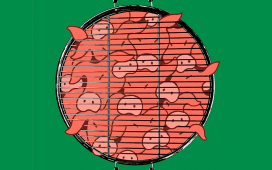Who could resist the title? László F. Földényi’s new book of essays is called “Dostoyevsky Reads Hegel in Siberia and Bursts Into Tears” (Yale). It sounds like something that might happen in a Dostoyevsky novel: cause and effect scrambled, reason abolished by extremity, the thunderclap of irrationality producing religious storms of weeping and abasement. And behind it all something faintly farcical, deliberately exaggerated—another of Dostoyevsky’s self-consciously scandalous “scenes.” After all, who in world history has ever read Hegel and burst into tears? Except of frustration?
It turns out that we don’t know if Dostoyevsky burst into tears, either; Földényi is punting here. But Dostoyevsky may well have read Hegel in Siberia. His American biographer, Joseph Frank, tells us that in 1854 he wrote to his brother in St. Petersburg, imploring him to send Kant, Vico, Ranke, and the Church Fathers, and “to slip Hegel in without fail, especially Hegel’s History of Philosophy. My entire future is tied up with that.” In 1849, Dostoyevsky had been arrested on bogus charges of revolutionary conspiracy in St. Petersburg, and sentenced to four years of hard labor in a prison camp in the Siberian town of Omsk. On his release, in the spring of 1854, he was sent to Semipalatinsk, in southern Siberia, where he began several years of military service. In effect, this was a further installment of exile: consignment to an “Asiatic” oubliette, a place unnoticed and forgotten, far from “European” Russia. Földényi, in the title essay of his collection, vividly sketches the town’s stark otherness—a gray, treeless outpost, surrounded by barren sandy plains, with a population of between five thousand and six thousand, “half of whom were nomadic Kazakhs, for the most part living in yurts.” An American journalist, visiting in 1885, struck by the sight of camels and “white-turbaned and white-bearded mullahs,” likened the place to “a Mohammedan town built in the middle of a North African desert.”
Hegel seems to have viewed Siberia similarly, except that he felt no need to actually see the place. Philosophically, Siberia was flyover country, of no world-historical import. In his “Lectures on the Philosophy of History,” published for the first time in 1837, Hegel begins his discussion of Asia with a disclaimer: “We must first of all eliminate Siberia, the northern slope of Asia. For it lies outside the scope of our enquiry. The whole character of Siberia rules it out as a setting for historical culture and prevents it from attaining a distinct form in the world-historical process.” This is what fascinates Földényi. What if, he hypothesizes, Dostoyevsky read Hegel’s lectures on the philosophy of world history while in Semipalatinsk? How would it have felt to hear the great German rationalist philosopher casting you out from the notice of history (and thus from the narrative of European development as he tells it), even as your own country had similarly cast you out? How might that have compounded Dostoyevsky’s punishment and suffering?
Földényi uses his essay to stage a broad metaphysical melodrama between opposites that he pursues throughout this fierce, provoking collection (expertly translated by Ottilie Mulzet). He likes to set up the Enlightenment tradition as overweeningly rational and then to use a selected opponent (Dostoyevsky, Heinrich von Kleist, Antonin Artaud, the Marquis de Sade, Mary Shelley) as an antirational or otherwise “Romantic” hatchet. Földényi makes Hegel his regal Enlightenment representative. And Hegel had indeed argued that universal history, when viewed philosophically, is rational: “Whoever looks at the world rationally will find that it in turn assumes a rational aspect; the two exist in a reciprocal relationship.” Hegel concedes that, down at the level of particulars, history is a bloody mess, even what he calls a Schlachtbank, a slaughterhouse; but he believes that, viewed from the right philosophical altitude, world history reveals itself as moving with purpose toward the realization and fulfillment of a Spirit—the universal idea of freedom. “Reason cannot stop to consider the injuries sustained by single individuals, for particular ends are submerged in the universal end,” he wrote. In this sense, history is not only rational but also providential: designed, purposive, teleological.
In Siberia, however, Dostoyevsky fell in love with something like the opposite: with the irrationality of miracle, with the impossible example of Jesus, and, in a sense, with suffering itself. In “Notes from Underground” (1864), Dostoyevsky certainly seems to be thinking of Hegel when his narrator, the Underground Man, concludes that anything can be said about the bloodbath and the mayhem of history except that it is rational: “You’ll choke on the word.” One of the great fictional ranters, the Underground Man mounts an all-out war against the dominant ideologies of nineteenth-century Europe: utilitarianism, scientism, liberal progressivism, communistic utopianism, and, above all, the prestige of rationality. History is not rational, Dostoyevsky’s narrator says, because humans are not. The human sciences are unable to account for our irrationality because they are unable to account for our desires. We want too many strange things (our “various little itches,” as Dostoyevsky wonderfully describes them), often in defiance of our apparent interests: we want to go to war, martyr ourselves for religious causes, take drugs, climb steep rock faces, have perilous affairs. For Dostoyevsky, freedom is tortuous and fraught, in part because it also involves the freedom to abuse it.
Földényi, a scholar and critic who teaches the theory of art, in Budapest, is an intense, tendentious, often maddening presence. Few books have as utterly engrossed and powerfully alienated me as this one has. He is drawn to all that was violent and metaphysically reactionary in Dostoyevsky; he admires the religious fist held up to the calm omnipotence of European reason and progress. What is exciting about his title essay is the way he inhabits Dostoyevsky in his very unreason. There is something beautiful in this ventriloquism. Taking the fight to Hegel, Földényi speculates that perhaps history reveals itself not to rational people “but to those whom it has cast out of itself.” In a brilliant moment of critical imagining—I think of Földényi as doing a kind of method acting—he jeers at Hegel’s proposal that whoever looks rationally at history will find that it looks rationally back at him. Well, Földényi asks, when Dostoyevsky glanced into his small mirror in Siberia, what did he see looking back? Not a rational man. Perhaps not even a man but an alienated other: “Nobody looks back at us from a mirror. We can try to bravely face ourselves: our gaze is engrossed in the eyeballs of a stranger, who stares fixedly into nothingness. Not only does this stranger not look outward, he does not even look inward. He is dead, numb—if we pay long attention—even haunting.”
The problem is that Földényi is not content to stage a merely imaginary struggle. He edges toward all-out brawls, generally between highly armed simplicities. On one side, there is Hegel, who is wielded by Földényi as the false god of everything most triumphantly repellent about Enlightenment rationality; and on the other side there is Dostoyevsky, righteously suffering and properly rebuking the European tradition for its secularizing arrogance. Földényi sees Hegel, and by extension the eighteenth- and early-nineteenth-century Enlightenment project, as a vast, disenchanting bulldozer, crushing God and mystery under the machinery of its rationality. Hegel’s narrative of history, Földényi says, might look religious, but in fact God has been dethroned. “In the Hegelian interpretation of history, everything designated ‘divine’ is subordinated to something under the supervision of human beings,” he writes. Enlightenment rationalism proceeded “in the name of God, but lacking all divine spirit.” Confident that it could solve everything, it sought explanation for things that could never be explained, and failed to respect the mystery of what Földényi calls “divine unboundedness” and, elsewhere, “the infinite and the transcendent.”








